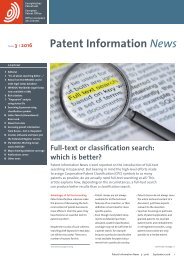Patent Information News
b1z1m_f
b1z1m_f
Create successful ePaper yourself
Turn your PDF publications into a flip-book with our unique Google optimized e-Paper software.
continued from page 1<br />
recommended making it machinereadable<br />
and including links to the<br />
classification symbols the examiner<br />
had searched. They also hoped that<br />
the EPO would one day publish the<br />
search strategy together with the<br />
search report itself.<br />
In a total of eight discussion rounds,<br />
current topics in patent information<br />
were discussed by the participants<br />
and the EPO’s experts. The conclusions<br />
are shown in the table below.<br />
The prospect of patent searches<br />
being done by a computer provoked<br />
a lot of debate following the two<br />
keynote talks. Luis Ignacio Vicente<br />
del Olmo of Spanish company<br />
Tele fónica set the scene, describing a<br />
dramatic increase in the number of<br />
patent applications in the field of ICT<br />
(information and communications<br />
technology). ICT, seen to gether with<br />
other developments such as the<br />
Internet of Things and Big Data<br />
was creating new challenges. He<br />
introduced an EU-funded project<br />
called CIFRA (Challenging the ICT<br />
<strong>Patent</strong> Framework for Responsible<br />
Innovation) that was identifying<br />
imperfections in the patent system.<br />
Personally, he said, he would recommend<br />
focusing on increased transparency.<br />
For him, this meant access<br />
to worldwide legal status information,<br />
tools to look at enterprises'<br />
patent port folios and, in the longer<br />
term, patent ownership information,<br />
as well as clear reasoning from<br />
patent offices when they granted or<br />
refused a patent.<br />
EPO principal director Grant Philpott<br />
took the discussion further, looking<br />
at the 4th Industrial Revolution<br />
(Industry 4.0) and predicting it<br />
would have a dramatic effect on<br />
society. "No job would be safe", he<br />
said, "if it is routine, a computer will<br />
do it." He noted that computers<br />
were already capable of analysing<br />
legal cases, citing studies that<br />
showed a remarkable level of<br />
synchronisation with the human<br />
judges who had handled the cases<br />
in real life. It was only a matter of<br />
time, he concluded, before patent<br />
searching would be automated.<br />
Main conclusions of the discussion rounds at the EPO <strong>Patent</strong> <strong>Information</strong> Conference 2016<br />
Discussion round<br />
Conclusions<br />
Search strategies – what are<br />
we learning from the EPO's pilot<br />
project?<br />
Harmonising and simplifying legal<br />
status codes<br />
1. Make search reports machine-readable<br />
2. Links to classification symbols<br />
3. Publish together with search report<br />
1. Need for harmonisation in legal status codes across offices<br />
2. Fewer and clearer codes<br />
3. Clarity in grouping (hierarchy)<br />
Open data in patents – recent<br />
developments in Europe and<br />
beyond<br />
What's the importance of patent<br />
indicators in patent valuation?<br />
Linking patent data and business<br />
data - why do it, and what are the<br />
hurdles?<br />
Are data protection issues<br />
hampering our access to patent<br />
information?<br />
1. Need for data accuracy and global standards<br />
2. Fair use policies essential<br />
3. Services needed for non-experts<br />
1. It is time to create a new user group for patent statistics and patent analysis<br />
2. Users need a dedicated training programme in this area<br />
1. Accurate patent assignee and ownership data is essential<br />
2. More data required from Asia and from SMEs<br />
3. The 18-month rule for patent publications delays data's availability<br />
1. <strong>Patent</strong> searchers should be aware of the European data protection<br />
directive, as it will affect their work<br />
2. Non-patent literature and copyright affects the patent searcher's access<br />
to good prior art<br />
Freedom-to-operate:<br />
what does the client expect from<br />
the patent searcher?<br />
1. Need for better OCR data, better machine translations and more full-text<br />
data from around the world<br />
2. Legal status data from Africa, the Middle East and Latin America<br />
is of growing importance<br />
3. For viewing, more highlighting features in the texts, and multiscreen<br />
viewing would aid searchers<br />
<strong>Patent</strong> information from Asia –<br />
still the challenge it used to be?<br />
1. Today's challenges concerning Chinese utility models, and patents<br />
in India, Russia, ASEAN and Iran<br />
2. Constant improvements to English language services<br />
(machine translations, English website interfaces) are essential<br />
Grant Philpott, EPO principal director<br />
and keynote speaker at the EPO <strong>Patent</strong><br />
<strong>Information</strong> Conference 2016<br />
He saw the patent searcher's future<br />
in very advanced searching and<br />
evalua tion.<br />
This conclusion tied in well with the<br />
presentations on legal status at the<br />
end of the conference by patent<br />
attorneys Tobias Wuttke and<br />
Susanne Hantos. Both of these<br />
speakers saw a growing need for<br />
patent searchers to understand<br />
legal status information, and by<br />
implication, the underlying patent<br />
laws (see separate article on page<br />
6 and 7).<br />
Other topics covered in the conference<br />
programme were full-text<br />
and semantic searching, patent<br />
monitoring and citation analysis.<br />
Many of the presentations are available<br />
on the EPO <strong>Patent</strong> <strong>Information</strong><br />
Conference website:<br />
www.epo.org/pi-conference<br />
2 <strong>Patent</strong> <strong>Information</strong> <strong>News</strong> 4 | 2016 December 2016




